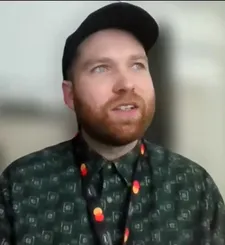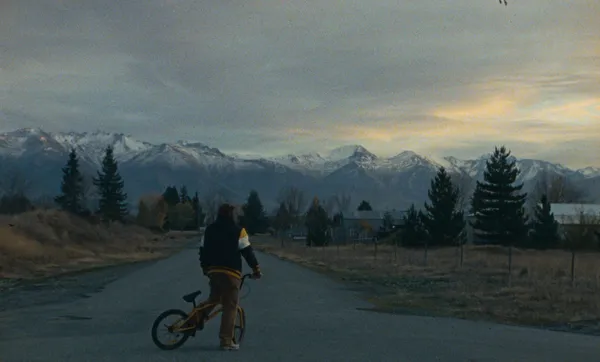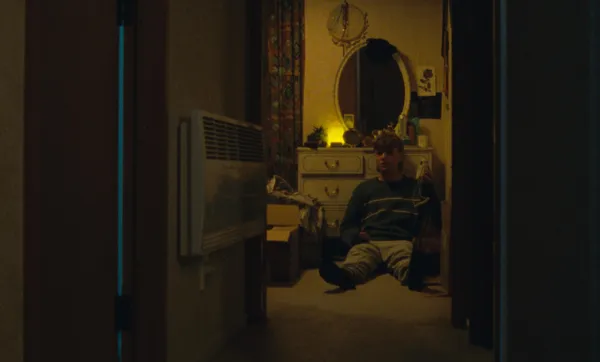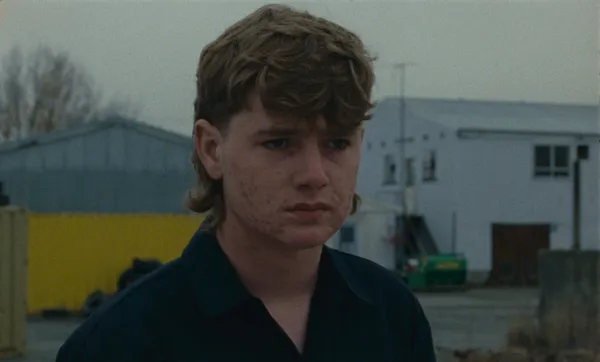Arthur Gay's latest short When The Geese Flew premiered at Cannes Film Festival's Directors' Fortnight and recently screened at San Sebastian Film Festival. The New Zealand-set short, co-written with Rali Chaoni – who is also working with Gay on their first feature When The Goats Came – follows Cyrus (Tom Kerr), a 15-year-old from a town in the middle of nowhere coming to terms with his sister Sammy's (Lee-Ann Dirks) imminent departure. A short that brings home a sense of place – and its impact on its central character – it is an accomplished short that inhabits the same world as the upcoming feature. We caught up with Gay ahead of the Cannes premiere to talk about how his own upbringing feeds his approach to filmmaking, his influences and the themes he wants to explore through his work.
Tell us about the origins of the story
Arthur Gay: I’m really interested in characters that are transient and struggling with the idea of what home means and where they belong within their familial dynamics. In my last film and also the feature I’m working on now the familial dynamic is really important.
 |
| Director Arthur Gay: 'All the stories I write definitely come from a very personal place' |
I moved around a lot when I was younger with my mother. We moved countries a lot of times. So, for me, the idea of home is a very important question but also that relationship with the one person that remains constant in your life. The one person that is, perhaps, grounding you, your one place of safety. I wanted to explore this with a sister/brother relationship but also Sammy plays a really important role as a mother figure in his life. I was interested in the experience of Cyrus of that person moving away. All the stories I write definitely come from a very personal place – I should say, the only experience I know.
The only thing Cyrus knows is this town, surrounded by vastness and I kind of like that idea that when Sammy leaves, he's there by himself.
It’s interesting you talk about a sense of place because I’ve also watched your short A Shared Moment Of Loneliness, and I’m struck by the way you seem interested in the interaction between the characters and their environment – the psychogeography seems important to you.
AG: The environment is a really important part for me. My memories are rooted in places and having moved a lot and I remember particular periods of my life and the space is what gives it shape. I remember right back when I was two years old – I was born in Switzerland – I have faint memories of there and I think that’s only because they’re such vivid spaces, it didn't match New Zealand. So space is incredibly important for me and I always think of it as another character. The frame and what inhabits the frame, in my mind, can represent how a character moves through their world, their psychological space. We spent a really long time location scouting for this – I always do actually, it always ends up being a long road trip, just sleeping in the back of the car for a few weeks driving around taking photos, seeing how a place feels.
Where did you film this?
AG: It was shot in Twizel in the South Island. Mulan was shot there and, within that region, areas of Lord Of The Rings. It’s a beautiful area, it's very specific. It's right in the Highlands leading up to the southern Alps, the Southern Alps run, right down the of the South Island.
 |
| Arthur Gay: 'Space is incredibly important for me and I always think of it as another character.' |
What I really like about it is that it serves a very specific purpose. There's not many company towns in New Zealand, it's more of a US thing, but this town was formed just to build these huge hydroelectric dams in the region. And I think it was a petition when the dam was completed, when ever who had spent years there said, “We want to keep this town”. So it really is in the middle of nowhere.
So you were born in Switzerland, but you’re a Kiwi basically and now you live in New York right?
AG: My mum and my dad met at art school in Switzerland and I was born there. I moved to New Zealand with my mum and then back to Switzerland and then back to New Zealand again when I was about three and then I moved to the UK for a year with my mum when I was six and then to Norway for four years and then back to New Zealand when I was 13. There was a lot of new experiences as a child. I ended up in New York. I moved over to study. I did my MFA at Columbia. I just graduated last year and this is my thesis film. For the time being I feel New Zealand is home although it's a complicated question and on many levels, what does home mean and who can call something home is a question I’m still exploring.
Your film definitely shares sensibilities with a lot of American indie films. It reminded me in some ways of Robert Machoian’s films, for example. Do you feel as though you are influenced by American Indie film?
AG: When I think of some of my favourites, I would say, Europe seems to hold a lot of them. But I was introduced to Kelly Reichardt’s films early on when I started maturing as a filmmaker. I just adore her films. Her work is incredibly inspiring for me. There’s a lot of transient characters, which I’m drawn to, and just her pacing. Also I love Gus van Sant and early on, in a different way, my dad introduced me to Jim Jarmusch when I first started getting into film and I’ve always appreciated the way he has of examining the strangeness of the world through his characters and their idiosyncratic behaviour.
The casting is important, not just because they’re very good but because they’re very ‘normal’. How hard was it to do?
AG: It was a lot. They’re very specific characters, particularly with Cyrus being at a particular juncture in his life. A 15-year-old that is both vulnerable and in need of the care of his older sister while also trying to put on this staunch front. If you find someone too old, they lose that childhood innocence and if you find someone too young they haven’t got to that transitional stage yet, so that in itself was a challenge.
 |
| Arthur Gay on casting Tom Kerr as Cyrus: 'He sent through a self tape and the instant I saw it, I knew that was the kid. He just got it' |
At first, I was actually wanting to do street casting for non-professional actors but Aaron Wilson, our casting director, is incredible and such a lovely human and we just went through a long process of casting and auditioning and Tom Kerr came up, he sent through a self tape and the instant I saw it, I knew that was the kid. He just got it. He turned 15 three days before we started shooting. He was a total dream.
Although it is a self-contained short film, it feels as though it could be something that's on its way to being developed into something longer and I wondered if it is or it isn't?
AG: We are working on a feature, and it's actually called When The Goats Came. Me and Rali Chaouni and our producer Laura Ganotis have been working on that for a while. We’re fortunate it went to the Sundance screenwriters’ intensive last year and we just got some early development funding from New Zealand and it is thematically in the same world. It's a double-hander with Cyrus, who’s 13, and his foster mother Flora. It’s not the same plot but thematically explores the relationship between the two characters. It’s not the same Cyrus but you can see the same behaviours and the same desires. We’ve got a bit more time in a feature to examine that relationship and their relationship to home.
I also wanted to ask you about Somewhere In Between, which is a documentary rather than a feature and, from the trailer looks pretty intense. Can you tell us about that?
AG: That’s been an ongoing project that is still not complete… but we're so close. Me and my ex-partner, we were in a particular phase in our life where we just felt like we needed to to just do something crazy and we walked the Te Araroa trail that runs from the top to the bottom of New Zealand. We took about four and a half months to walk it. It's about 3,000km (1,864 miles). We both had a lot of questions, we're asking ourselves and it was a beautiful experience.
The documentary? I didn't know what I was filming. I was questioning myself as a filmmaker and what I had to say. There's no path and it feels sometimes just so overwhelming and full of doubt. We started walking and I carried all my camera gear with me, and just filmed the whole journey. It was a challenging but also beautiful and cathartic experience. The film means a lot and I'm looking forward to really putting it out there.






















